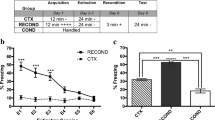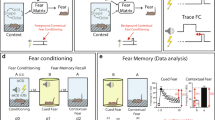Abstract
Rationale
The psychoactive substance, caffeine, may improve cognitive performance, but its direct impact on learning and memory remains ill defined. Conflicting reports suggest that caffeine may impair as well as enhance Pavlovian fear conditioning in animals and its effect may vary across different phases of learning.
Objectives
The purpose of this study is to dissect the effect of a motor-stimulant dose of caffeine (30 mg/kg intraperitoneal (i.p.)) on acquisition, retrieval or consolidation of conditioned fear in C57BL/6 mice.
Methods
Fear conditioning was evaluated in a conditioned freezing paradigm comprising 3 tone-shock pairings and a two-way active avoidance paradigm lasting two consecutive days with 80 conditioning trials per test session.
Results
Conditioning to both the discrete tone-conditioned stimulus (CS) and the context was markedly impaired by caffeine. The deficits were similarly evident when caffeine was administered prior to acquisition or retrieval (48 and 72 h after conditioning); and the most severe impairment was seen in animals given caffeine before acquisition and before retrieval. A comparable deficit was observed in the conditioned active avoidance test. By contrast, caffeine administered immediately following acquisition neither affected the expression of tone freezing nor context freezing.
Conclusions
The present study challenges the previous report that caffeine primarily disrupts hippocampus-dependent conditioning to the context. At the relevant dose range, acute caffeine likely exerts more widespread impacts beyond the hippocampus, including the amygdala and striatum that are anatomically connected to the hippocampus; together, they support the acquisition and retention of fear memories to discrete stimuli as well as diffused contextual cues.





Similar content being viewed by others
References
Angelucci ME, Vital MA, Cesário C, Zadusky CR, Rosalen PL, Da Cunha C (1999) The effect of caffeine in animal models of learning and memory. Eur J Pharmacol 373:135–140
Bakshi VP, Geyer MA, Taaid N, Swerdlow NR (1995) A comparison of the effects of amphetamine, strychnine and caffeine on prepulse inhibition and latent inhibition. Behav Pharmacol 6:801–809
Borota D, Murray E, Keceli G, Chang A, Watabe JM, Ly M, Toscano JP, Yassa MA (2014) Post-study caffeine administration enhances memory consolidation in humans. Nat Neurosci 17:201–203
Cestari V, Castellano C (1996) Caffeine and cocaine interaction on memory consolidation in mice. Arch Int Pharmacodyn Ther 331:94–104
Corodimas KP, Pruitt JC, Stieg JM (2000) Acute exposure to caffeine selectively disrupts context conditioning in rats. Psychopharmacol (Berl) 152:376–382
Dall’Olio R, Gandolfi O, Montanaro N (1978) Effects of pre- and post-trial caffeine administrations upon “step-down” passive avoidance behavior in rats submitted or not to electroconvulsive shock. Pharmacol Res Commun 10:851–858
De Oliveira RV, Dall’Igna OP, Tort AB, Schuh JF, Neto PF, Santos Gomes MW, Souza DO, Lara DR (2005) Effect of subchronic caffeine treatment on MK-801-induced changes in locomotion, cognition and ataxia in mice. Behav Pharmacol 16:79–84
Dubroqua S, Yee BK, Singer P (2014) Sensorimotor gating is disrupted by acute but not chronic systemic exposure to caffeine in mice. Psychopharmacology (Berl), in Press
El Yacoubi M, Ledent C, Ménard JF, Parmentier M, Costentin J, Vaugeois JM (2000) The stimulant effects of caffeine on locomotor behaviour in mice are mediated through its blockade of adenosine A (2A) receptors. Br J Pharmacol 129:1465–1473
Ferré S (2008) An update on the mechanisms of the psychostimulant effects of caffeine. J Neurochem 105:1067–1079
Ferreira TL, Moreira KM, Ikeda DC, Bueno OF, Oliveira MG (2003) Effects of dorsal striatum lesions in tone fear conditioning and contextual fear conditioning. Brain Res 987:17–24
Ferreira TL, Shammah-Lagnado SJ, Bueno OF, Moreira KM, Fornari RV, Oliveira MG (2008) The indirect amygdala-dorsal striatum pathway mediates conditioned freezing: insights on emotional memory networks. Neuroscience 153:84–94
Fredholm BB, Bättig K, Holmén J, Nehlig A, Zvartau EE (1999) Actions of caffeine in the brain with special reference to factors that contribute to its widespread use. Pharmacol Rev 51:83–133
Geyer MA (2006a) Are cross-species measures of sensorimotor gating useful for the discovery of procognitive co-treatments for schizophrenia? Dialogues Clin Neurosci 8:9–16
Geyer MA (2006b) The family of sensorimotor gating disorders: comorbidities or diagnostic overlaps? Neurotox Res 10:211–220
Geyer MA, Krebs-Thomson K, Braff DL, Swerdlow NR (2001) Pharmacological studies of prepulse inhibition models of sensorimotor gating deficits in schizophrenia: a decade in review. Psychopharmacol (Berl) 156:117–154
Gulick D, Gould TJ (2009) Effects of ethanol and caffeine on behavior in C57BL/6 mice in the plus-maze discriminative avoidance task. Behav Neurosci 123:1271–1278
Hsu CW, Chen CY, Wang CS, Chiu TH (2009) Caffeine and a selective adenosine A2A receptor antagonist induce reward and sensitization behavior associated with increased phospho-Thr75-DARPP-32 in mice. Psychopharmacol (Berl) 204:313–325
Kim JJ, Fanselow MS (1992) Modality-specific retrograde amnesia of fear. Science 256:675–677
Kopf SR, Melani A, Pedata F, Pepeu G (1999) Adenosine and memory storage: effect of A (1) and A (2) receptor antagonists. Psychopharmacol (Berl) 146:214–219
Nehlig A (2010) Is caffeine a cognitive enhancer? J Alzheimers Dis 20(1):S85–94
Oka M, Yamada K, Yoshida K, Shimizu M (1980) Avoidance enhancement and discriminative response control by anxiolytics with drugs acting on the GABA system. Jpn J Pharmacol 30:325–336
Overton D (1983) State-dependent learning and drug discrimination. In: Iversen LL, Iversen SD, Snyder SH (eds) Handbook of psychopharmacology, vol 18, Plenum Press, New York, Vol., pp 59–127
Overton DA (1991) Historical context of state dependent learning and discriminative drug effects. Behav Pharmacol 2:253–264
Petkov VV, Rousseva S (1984) Effects of caffeine on aggressive behavior and avoidance learning of rats with isolation syndrome. Methods Find Exp Clin Pharmacol 6:433–436
Phillips RG, LeDoux JE (1992) Differential contribution of amygdala and hippocampus to cued and contextual fear conditioning. Behav Neurosci 106:274–285
Sallaberry C, Nunes F, Costa MS, Fioreze GT, Ardais AP, Botton PH, Klaudat B, Forte T, Souza DO, Elisabetsky E, Porciúncula LO (2013) Chronic caffeine prevents changes in inhibitory avoidance memory and hippocampal BDNF immunecontent in middle-aged rats. Neuropharmacology 64:153–159
Sanday L, Zanin KA, Patti CL, Fernandes-Santos L, Oliveira LC, Longo BM, Andersen ML, Tufik S, Frussa-Filho R (2013) Role of state-dependent learning in the cognitive effects of caffeine in mice. Int J Neuropsychopharmacol 16:1547–1557
Sansone M, Battaglia M, Castellano C (1994) Effect of caffeine and nicotine on avoidance learning in mice: lack of interaction. J Pharm Pharmacol 46:765–767
Seldon N, Everitt B, Jarrard L, Robbins T (1991) Complimentary roles for the amygdala and hippocampus in aversive conditioning to explicit and contextual cues. Neuroscience 42:335–350
Shen Z, Wang G, Lin SZ (1990) Two-way shuttlebox avoidance conditioning and brain NADH in rats. Physiol Behav 48:515–517
Singer P, Wei CJ, Chen JF, Boison D, Yee BK (2014) Deletion of striatal adenosine A(2A) receptor spares latent inhibition and prepulse inhibition but impairs active avoidance learning. Behav Brain Res 242:54–61
Wei CJ, Augusto E, Gomes Ca, Singer P, Wang Y, Boison D, Cunha RA, Yee BK, Chen GF (2014) Regulation of fear responses by striatal and extrastriatal adenosine A2A receptors in forebrain. Biol Psychiatry 75:855–863
Yee BK, Balic E, Singer P, Schwerdel C, Grampp T, Gabernet L, Knuesel I, Benke D, Feldon J, Mohler H, Boison D (2006) Disruption of glycine transporter 1 restricted to forebrain neurons is associated with a procognitive and antipsychotic phenotypic profile. J Neurosci 26:3169–3181
Yonkov DI (1984) Possible role of brain dopaminergic systems in the memory effects of central stimulants. Methods Find Exp Clin Pharmacol 6:235–239
Zarrindast MR, Shafaghi B (1994) Effects of adenosine receptor agonists and antagonists on acquisition of passive avoidance learning. Eur J Pharmacol 256:233–239
Acknowledgments
The authors would like to acknowledge the support from US National Institutes of Health (Grant R01MH083973), and the Legacy Foundation Grant awarded to BKY.
Conflict of interest
The authors have no conflict of interest to declare.
Author information
Authors and Affiliations
Corresponding author
Rights and permissions
About this article
Cite this article
Dubroqua, S., Low, S.R.L., Yee, B.K. et al. Caffeine impairs the acquisition and retention, but not the consolidation of Pavlovian conditioned freezing in mice. Psychopharmacology 232, 721–731 (2015). https://doi.org/10.1007/s00213-014-3703-2
Received:
Accepted:
Published:
Issue Date:
DOI: https://doi.org/10.1007/s00213-014-3703-2




